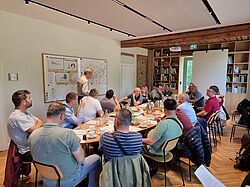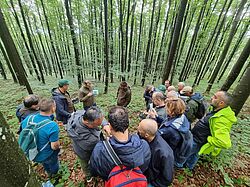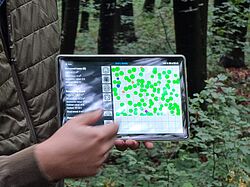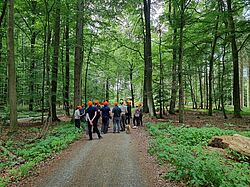
Sustainable Forest Management
Focus
The working group on sustainable forestry was founded in 2022. The aim is to create the political framework conditions for close-to-nature forest management.
First, development needs in the project countries were analyzed and, based on this, seven priority policy areas were identified that are important for all Western Balkan countries. In a further step, an implementation plan is to be drawn up for at least two of these fields. The focus here is on ensuring that forestry guidelines and legal regulations are designed in such a way that they are compatible with EU requirements. The HessenForst state enterprise will share its experience in this regard. In addition, the already established network for the exchange of experience is to be further strengthened.
Activities
The working group meets up to three times a year in the project region. At its meetings, the members of the working group share their progress and experiences.
The first trip to Germany took place in June 2023. This included insights into the forestry training center and the youth education center in Weilburg, the Hanau-Wolfgang forest district, which deals with reproductive material, ecotourism and nature education, a field presentation on forestry in climate change in the Weilmünster forest district and a visit to the Kellerwald/Edersee National Park with beech forests, which are a UNESCO World Heritage Site. The HessenForst state enterprise gave an impressive demonstration of how forest management planning can be implemented with the help of management guidelines.
Two topics are currently being identified for which implementation plans will then be drawn up. At the same time, the development needs of Moldova are being analyzed and compared with the priorities already identified for the Western Balkan states.
Results
Based on the needs analyses, individual recommendations were developed for each state on how forestry can be improved. In this context, the Hessian "Forest Construction Guide" was presented as an example and its implementation was demonstrated during the exposure visit.
These policy areas were prioritized:
- Anchoring biodiversity in the legal framework and forestry practice so that forest biodiversity can be analyzed and monitored in the long term
- Establishment of a forest information system and creation of a forest database
- Development and application of guidelines for sustainable forest management and the implementation of close-to-nature silviculture
- Development of a sustainable approach to lifelong learning in forestry practice
- Private forest ownership: support in the formation of forest owner associations to meet future challenges in forest management
- Establishment of a framework for forest restoration to achieve land degradation neutrality
- Forest policy reform to meet the challenges of climate change
Further information
Further information and presentations from the working group meetings can be found here.





